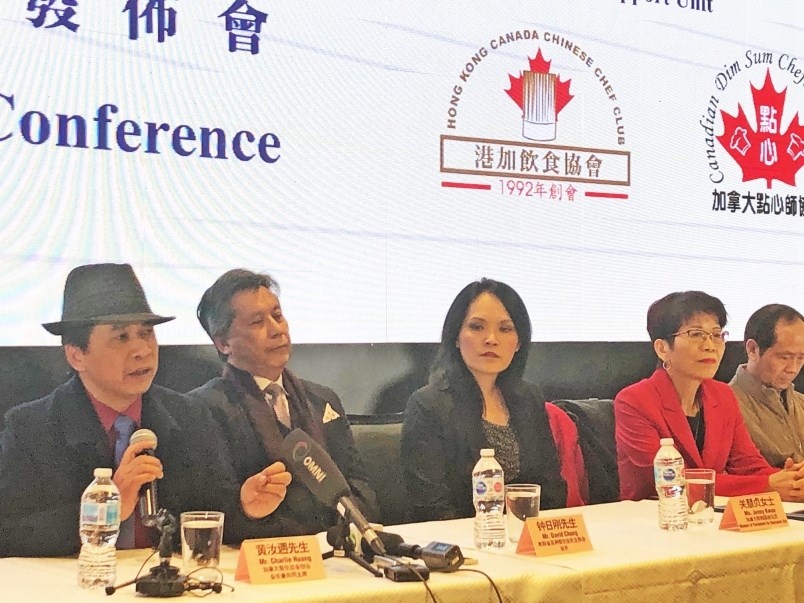Chinese restaurant industry leaders in Metro Â鶹´«Ã½Ó³»asking for tax breaks due to a drop in business from coronavirus say they are not aware of widespread unreported cash schemes and kickbacks in the sector, as outlined in a recent court ruling that exposed a notable meat supplier’s admission of such tactics.
At least one leader, however, believes any assistance brought forth by governments ought to be predicated on a restaurant’s income tax filings.
On February 21 the Canada Catering Association and BC Asian Restaurant Café Owners Association, and other industry associations, joined MP Jenny Kwan, MLA Teresa Wat and Richmond city councillor Chak Au at a press conference in Richmond to call on all three levels of governments for a bailout, as local ethnic Chinese people self-quarantine from public eateries due to fear of coronavirus contraction — actions those politicians are calling unnecessary and harmful to the local economy.
Kwan made opening remarks to the conference stating the entire sector is under duress due to COVID-19 — even suppliers.
“There are other areas that are impacted too,” Kwan said. “The suppliers are impacted as well, so there’s a ripple effect in that way; so we should think about it in a broader context.”
However, this month a BC Supreme Court divorce ruling revealed a multimillion-dollar unreported cash scheme on the part of Jun Cheng (John) Jiang, founder and owner of Wingsum International Trading Inc. (WIT), a self-described Chinese meat supplier that conducts extensive business with the Asian restaurant sector in Metro Vancouver.
That WIT was running “an illegal unreported cash scheme from 2013 to at least 2015, whereby salespeople collected payments in cash, and John collected the cash without reporting it to CRA,” is “undisputed,” wrote Justice Mark McEwan.
WIT is now subject to legal proceedings launched by the Minister of National Revenue for unpaid taxes and property foreclosure applications from TD Canada Trust for unpaid debt and mortgages in default, court records show.
Based on evidence from the jointly appointed forensic auditor Shane Troyer, WIT had over $2.7 million in unreported cash income, which Jiang’s wife Yi Meng (Sharon) Wang submitted to the court “is only the tip of the iceberg on the total missing cash.”
But Troyer “confirmed that the company financial statements fraudulently excluded substantial undeclared cash,” wrote McEwan, and Troyer “had no way to confirm if this was all of the missing cash; given there are no source documents.”
WIT appears to be a busy supplier in Richmond, where it operates warehouses, and elsewhere. McEwan accepted Troyer’s estimate that the company had earned about $24 million in gross sales in 2018.
The ruling alludes to the potential of a prevalent systemic structure of tax evasion in Richmond’s restaurant sector — a jewel of the city’s tourist attractions.
McEwan noted John “admits restaurant owners knew he was not declaring the cash income” and some sort of “kickback scheme” with restaurants had been occurring. (No details on the kickback scheme are given in the judgment).
To better understand the meat processing business, Troyer, the forensic auditor, was assisted by another local meat processor named George Choy who said, according to McEwan’s ruling based on Troyer’s report, “cash payments from restaurants is common. Restaurant employees, chefs, and supplier employees, want to be partly paid in cash or they go elsewhere where they can get paid in cash.”
According to Sharon’s testimony, Troyer told her “CRA [Canada Revenue Agency] audits in this industry are common and many have been caught.”
Canada Catering Association president Charlie Huang said he is not aware of any widespread cash and kickback schemes occurring in the industry and he had no knowledge of who Wingsum is. BC Asian Restaurant Café Owners Association president David Chung said the same.
Chung was asked if cash is king in the sector.
“No way. I don’t know why they do that. But we don’t deal with that,” said Chung, who also owns Dava Developments Ltd. and is a landlord to Chinese diners.
Such restaurants have reported business falling off by as much as 80% in some cases since the coronavirus outbreak was first made public on Jan. 20 in Wuhan, China.
When asked how government determines who gets tax breaks, Huang said, “most of Chinese restaurants. Most of them.”
When asked if Korean or Japanese or any other restaurants could get handouts, Huang suggested the businesses most affected are Chinese.
When asked how much tax relief is to be determined, Huang offered no specific suggestions, although when told of Wingsum’s scheme and asked if restaurants should provide previous tax filings to compare the loss of business, he agreed they should.
“Yeah, I think so, because, obviously, you have paid the tax before. If you haven’t paid any tax why are you asking?” said Huang.
GST and PST refunds and property tax relief are some suggestions from the industry and Kwan herself.
Kwan said she “wants governments to come together and talk to industry.
“One option is to propose relief in GST and PST and property taxes,” Kwan said. “That certainly is one approach.”
She also spoke about unwarranted fears of going to restaurants as well as racism in the community.
BC Liberal MLA Wat criticized Kwan’s provincial NDP colleague.
“The Finance Minister Carole James dismissed the need for immediate relief. So we will continue to press the finance minister and premier to come up with some kind of relief and lifeline for industry,” said Wat.
Wat said, “the most unfortunate part is to lay off employees. This is not good for government because the government will have to pay an employment payment.”
Wat was referring to Employment Insurance benefits provided through the federal tax system, which are based on an employee’s reported income.
Wat left the news conference after a question period from media was announced.



